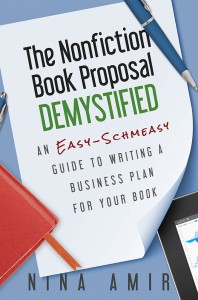
If you think you can blog a book or book a blog without preparation, you’re right. If you think you should, you’re wrong.
It takes work to craft a book that sells—whether it’s a book you write in blog-post-sized bits or that you create from repurposed posts. I’m not talking about writing either. I’m talking about taking proven steps before you compose a word or compile even one post into a manuscript. The writing part will then be easy (or easier). And you’ll produce a book with a higher-than-average chance of becoming a bestseller, which means it will get read.
Plan for Success
Too many writers just want to write. In much the same way that they don’t want to promote, they don’t want to do the necessary planning to ensure their book are marketable or viable. I know some bloggers who feel this way as well. They possess the willingness to write blog posts but won’t share them on social networks, which entails promotion. Nor will they take the time to learn what their readers want or determine how to distinguish their blogs from other similar sites on the same topic.
If you balk at doing anything other than coming up with a book idea and then rushing off to begin writing, this post serves as your wake up call.
For example, I know someone who explored all the different book design blogs before he began blogging on the topic. He made sure he had a plan to provide something different. He knew he could carry out that plan because he had studied both the market and the other bloggers publishing in that niche. Based on his research, he devised a content plan that was necessary for his readers and unique in that niche in the blogosphere.
In other words, he didn’t just decide one day to blog about book design and start blogging immediately. He prepared. And now his blog is enormously successful. Why? He planned for success. He prepared for success. If you want to check out that blog, go to TheBookDesigner.com.
I’ve written eight Amazon bestsellers. This did not happen by chance. I prepared; I planned for each book by creating a business plan prior to beginning my manuscript.
Basic Preparation to Create Books that Sell
The average book today sells only about 250 copies per year. The average ebook sells 560 copies per year. You don’t want your book to be average. And you can avoid that fate—if you prepare before you write a word.
I suggest you put together a complete business plan for your book based on the sections in a book proposal (even if you want to self-publish). But if you are just too antsy to get started—and too unwilling to do this work, then do at least two things to prepare to blog your book or book your blog:
- Conduct a market analysis
- Conduct a competitive analysis
Then, use the information you gain to craft the best book idea possible—a book that your readers want and need and that the category currently lacks.
If you don’t understand why I stress preparation, let’s look more closely at these two steps and how they help you craft a book that sells.
Your Market Analysis
Evaluating your market begins with knowing your ideal reader. Create a profile of that reader. Then branch out.
As I wrote in The Nonfiction Book Proposal Demystified:
This part of the [business plan] describes large groups of ideal readers who would purchase your book—actual target markets. Some people call this a book’s audience. The point of this section is simple: Prove enough readers exist to purchase your book so that publishing it appears to be a profitable venture.
To determine your market or markets, answer the question: Who would be interested in my topic? Who will buy my book? And who needs or wants my book? Include demographic information in your answers if you can.
 How do you do this? Use Google or Yahoo and find statistics and information about the size of these groups. For example, if your book deals with women’s issues, your primary market might be women. Some statistics say there are 150,000,000 women in the U.S. and 3,301,112,087 women in the world.
How do you do this? Use Google or Yahoo and find statistics and information about the size of these groups. For example, if your book deals with women’s issues, your primary market might be women. Some statistics say there are 150,000,000 women in the U.S. and 3,301,112,087 women in the world.
Get more specific about the types of women who will read your book. Doing so narrows your market, which will make it easier for you to target it. To narrow your market, look back at you reader profile. Are your ideal readers women business owners, women who own dogs, single women, Christian women, or women who travel? The more you can narrow your market, the easier time you will have finding readers.
Why is this analysis important to your success? You’ve heard the advice: Know your reader. Or maybe: Write for your reader. You can’t do that unless you have identified your reader. And if there aren’t enough people interested in your topic, your book won’t sell. There simply won’t be enough people to read your book.
Your Competitive Analysis
The competitive analysis looks at the other books your readers might purchase instead of yours given a choice. The competitive books are similar to yours in subject and scope. Study what books have been written and published on your topic and how your idea compares to these books.
Why is this important to the success of your book? A competitive analysis convinces you, if you self-publish, or a publisher, if you traditionally publish, that the book you plan to write will add something new to existing titles on a particular bookstore shelf.
As I explained in The Nonfiction Book Proposal Demystified:
In the publishing industry we say, “Make sure your book fills a hole on the shelf.” That means, find a place among the already published books on the appropriate shelf in a store where yours would be stocked and where a title appears to be missing. That’s where you want your book to reside. It should fill that gap in that particular category by providing something that doesn’t yet exist—something readers want but can’t yet find. Your book idea should be angled so it covers the information that hasn’t yet been covered or written about in the category.
How to Put Planning to Use
With these two analysis completed, you can hone your blogged book or booked blog idea. By that I mean, you can determine how best to angle your book to meet the needs of your readers and to provide a product to the market that is unique and necessary in the bookstore category. To accomplish this task, allow the light bulbs to go on as you profile your reader and study the market and competition. Get creative! Be open to new ideas not stuck with the belief that your original idea was the best one you could create.
The more you know about your reader, the more you know about how to provide a book they want to read. Discern their:
- Questions
- Concerns
- Problems
- Pain Points
- Wants
- Needs
Then determine how to provide:
- Answers
- A way to ease their anxiety
- Solutions
- Prescriptions
- A way to obtain what they want
- A way to obtain what they need
Provide these benefits, this value, in your book, and you will have targeted your market. (If you know enough about your market, you’ll also know how to “find” them, or target them, when it comes time to promote your book.)
Each competitive book you study provides an opportunity to find new ways to improve your idea. As you evaluate them, discover:
- What is missing.
- What you can model from those that are well done.
- What you want to avoid doing because it has been done before—many times.
- What the other authors have not done.
Put this information to use in your book.
Prepared to Write
Once you’ve taken these preparatory steps, you are ready to write. But you won’t write just any blogged book or compile just any booked blog; you’ll produce a book from your blog with a higher-than-average likelihood of outselling the other books in its category. Why? Because you did the work that so many other authors don’t do. You prepared before you blogged your book or booked your blog.

Hello Nina:
You give the advice that when blogging a book, we should retain about 20% and not post it; save it for the actual book. Do you have any suggestions for how to choose which 20% to save?
Thanks!
Elsie,
That totally depends upon your book! I’d have to look at the content and decide…
It’s really a great blog for all the writers who just start writing books without doing any preparation and don’t know what they need before writing the book. Even they don’t know about what the actual reader wants from a book, They just write the thing they know best from their imaginations and ideas. Due to this reason, few writers & their books may not get the popularity. I’ll definitely recommend to all newbie writers/bloggers to read your wonderful blog before started writing a book/blog to make them successful.
Once again many thanks to writing such a wonderful blog.